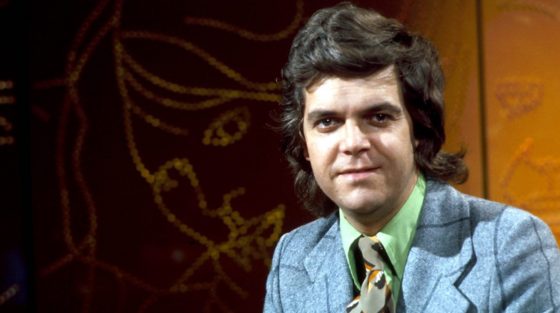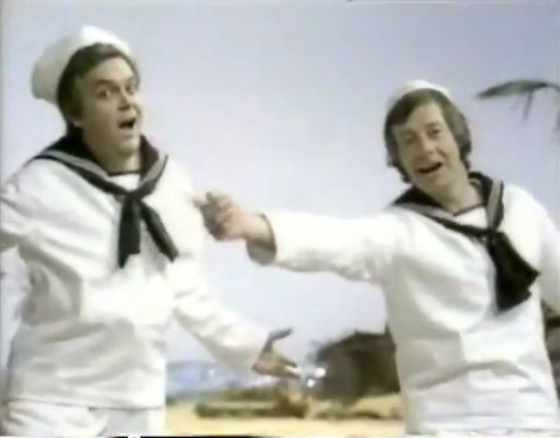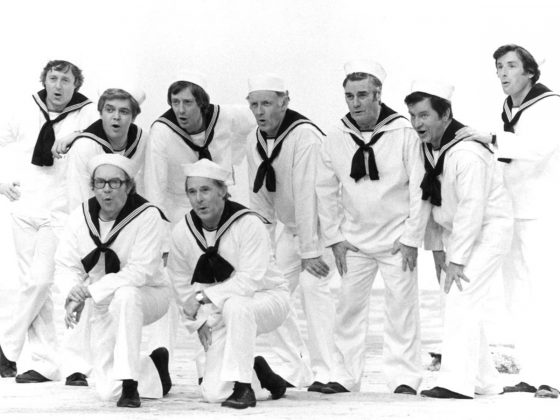Now who remembers this from Tyne Tees Television because I certainly do and remember it well
In 1989, Jenkinson fronted a series for commercial television, The Great Trailer Show, once again using material from his own collection. After several episodes, the series was pulled when distributors threatened to sue, having realised that substantial revenue was being lost to them by the use of unauthorised clips

Philip, it is said by someone who knew him, had a stubborn side and this led to the axing of The Great Trailer Show. Warner Brothers were threatening to take action if he showed a trailer from one of the Hammer Dracula films. It was suggested that he didn’t go ahead with the showing. as Warners seemed to be looking for a fight but he decided to take them on.
Warners frightened the life out of Channel 4 and this resulted in the whole series being binned.
After this, Philip Jenkinson disappeared from public view, living in semi-retirement and becoming rather reclusive, although fondly remembered by those who shared his passions.
I thought he was very knowledgeable on films and also extremely good appearing on Television – and interesting too.
I liked him and the things that he tried to do – particularly this show which I loved even though it only survived a few episodes – I wonder if any of them are available now or even still exist ? I hope so.

I also came across this tribute to Philip on the Britmovie Forum – it is very well written and I hope this gentleman Barry will forgive me copying it and including it in this article – it was published in March 2012.
This is what Barry wrote :-
‘I knew Philip Jenkinson extremely well. Given the interest shown here, I thought I’d share some recollections.
I grew up in south London in the ’70s, where my best friend at school was Phil’s son Lee. Phil’s movie collection at the time must have consisted of about two thousand five hundred titles on 16mm, yet it was the quality of the library that was even more notable than the size of it. Phil was a voracious film collector but also a true connoisseur; in his house in Blackheath he had a properly-built screening room with sealed-off projection. This was where I spent much of my teenage years and where Lee, and later, Phil (after he recovered from rather a long “lost weekend” that left him indisposed for much of 1974-1976) showed me almost every significant Hollywood movie of “the golden age”, i.e. pre-seventies American cinema. We went through the entire collection, director by director, genre by genre: Ford, Hawks, Cukor, Hitchcock, Welles, Busby Berkeley, Mamoulian, Nicholas Ray, Douglas Sirk, Billy Wilder, Wellman, Lang, in fact every important American film-maker with virtually no exceptions. Phil Jenkinson possessed astonishing rarities, such as perfect technicolor, Panavision prints of “Vertigo” and “Rear Window” when they were out of distribution for many years. He also loved and possessed hundreds of B-movies, introducing me to the work of genre directors like Sirk and Val Lewton (whose oeuvre Phil owned in its entirety). It was the greatest film school imaginable, in south London, no less. Phil adored musicals, westerns, film noir, comedy; this was where I first watched all of the Marx Brothers’ films, all the classic silent comedies and every so-called “screwball” comedy of the 1940s. It was before video; you could neither rent films on videocasette nor record them off the TV. Phil’s attitude to non-American cinema was more sceptical; in fact, any form of artsiness or pretention generally provoked hilarious, lengthy, profane torrents of abuse. However, he showed me Lindsay Anderson’s astonishingly good “This Sporting Life” and many French thrillers by Melville et al. He had, and screened for me, every movie made by Jean Renoir and Jean Cocteau. He even had a lot of classic American TV; I remember rolling around Phil’s sofa crying with laughter when he first ran comedy bits from Sid Caesar’s “Your Show of Shows”. When I met Sid Caesar in Los Angeles in the early ’90s, I told him about Phil and, because even Sid had no record of those early broadcasts, I asked Phil to run off a VHS copy to give to the delighted comedy genius for his birthday.
Learning about movies at Phil Jenkinson’s feet in the pre-video age made me extraordinarily, precociously film-literate. It qualified me to write bumptious but well-informed film criticism at Cambridge in the early eighties when film was beginning to be seen as, if not exactly an academic pursuit, then worthy of academic scrutiny. And Phil’s preference for American film was soon reflected in the larger culture, too, as Fellini, Antonioni, Bergman and Godard were joined — arguably even replaced — on the podium not just by Hitchcock, who had always been the token “American” director in this company, but by Ford, Welles, Nick Ray and even the very young Martin Scorsese. Thanks to having seen it many times at Phil’s house, I knew Charles Laughton’s “Night of the Hunter” to be a neglected classic, so I wrote about it in the university arts magazine after which it was booked at the Arts Cinema for a week-long run, where it played to packed houses every night.
Phil steered me into a career in the movies, not only by giving me the most privileged education in cinema imaginable but by believing I could succeed, a belief not held by my parents at that time. For this reason, the Jenkinsons — Phil, Lee and Phil’s beautiful, long-suffering English rose of a wife, Sally — became a substitute family for me. After I learned to drive and all through my twenties, in fact right up until I emigrated to America in 1987, I spent two or three evenings a week, often until very, very late, watching movies at the Jenkinsons. By the mid-80s Lee had acquired a rock and roll lifestyle; the “straps”, as the screenings became known because it was as though you were strapped to your chair while Phil held forth, very eloquently but also at bladder-straining length, took on a somewhat bohemian flavour. I brought every girlfriend I had to a strap or two; it was a necessary rite-of-passage. If she didn’t like these people or this activity, the relationship was probably doomed. Most of them passed with flying colours, as it was difficult not to warm to Phil and enjoy watching superb movies while Sally made the tea and chimed in with acerbic, often very funny, commentary of her own (on Joan Crawford: “she was good at emoting in mink”)
By the late eighties video arrived with a vengeance. Phil understood its convenience –and, at about a hundred and eighty pounds, welcomed the break from hauling huge cans of 16mm film up two flights of stairs from his garage across the way — but the romance of film collecting was at an end. No longer was he invited to screen movies for Ringo Starr or lend them to Bob Monkhouse. Phil’s collection was the product of very specific circumstances; for example, while Phil was working as the presenter of “Film Night” for the BBC, Warner Brothers offered him their entire UK-housed stockpile of 16mm prints after their TV license deal expired rather than pay to ship them back to Burbank; that’s how Phil got to own, and I got to watch, every gangster movie made for Warners in the heyday of Jimmy Cagney, every Bette Davis weepie, in fact, everything made at the studio from “The Roaring Twenties” to “Bonnie and Clyde”
Oh, and how could I have forgotten to mention that Phil owned every foot of film shot by Leni Riefenstahl, Hitler’s cinema-propagandist-in-chief, who, in her mid-eighties and dressed in spandex leggings, showed up in Blackheath one winter’s night to see Phil’s mint-condition print of “Olympische Spiele”, in all it’s bonkers glory, for the first time since the mid-1940s?
Phil’s last years were not easy. He did not take well to obscurity. The once-magnificent film library was sold off after it ceased to provide a regular income. Sally, whose grace and common sense anchored the family, died, far too young, of cancer in the late ’90s, after which the centre ceased to hold. Phil experienced a slow, painful decline, yet, for a hypochondriac ex-alcoholic, barely-reformed ’60s party animal who smoked thirty Silk Cut a day for fifty years, he lived a long and productive life. My own would have been quite different if Phil hadn’t been in it. When I received an email last week, from his nephew, titled simply “Phil”, I knew what I was about to read before opening it. I had always loved Phil and suspected that I could never repay all the kindness, generosity and hospitality he bestowed on me for years; now I know I can’t.’
Thanks Barry for this

Just to say that Vertigo was in VistaVision, not Panavision.
Yes I did know this David – if I mentioned Panavision then that is plainly incorrect – it was certainly in VistaVision.
Brilliant process. Neil
… [Trackback]
[…] Find More on on that Topic: filmsofthefifties.com/philip-jenkinson-the-great-trailer-show/ […]
Your article helped me a lot, is there any more related content? Thanks! https://www.binance.com/id/register?ref=UM6SMJM3
… [Trackback]
[…] Info on that Topic: filmsofthefifties.com/philip-jenkinson-the-great-trailer-show/ […]
phtaya 63 https://www.phtaya-63.org
… [Trackback]
[…] Read More on to that Topic: filmsofthefifties.com/philip-jenkinson-the-great-trailer-show/ […]